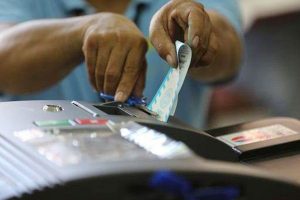
Smartmatic challenge expected
THE COMMISSION on Election (Comelec) said on Thursday that it expects its En Banc resolution that disqualifies voting technology provider, Smartmatic, from participating in Philippine elections to be challenged before the Supreme Court (SC).
It became apparent during the Comelec press conference that Comelec Chairman George M. Garcia was holding back on comments on their resolution. “Any moment from now, somebody will go to the Supreme Court, and therefore, any statement we will make now will and can be used against the commission,” he said in mixed English and Filipino.
“We don’t want the decision to be disregarded simply because of a loose tongue. What we say may be used against us when it reaches the Supreme Court,” he added.
A day after the resolution was made public, Smartmatic said it was not given the opportunity to provide comments or respond to the grounds used by the commission ban the firm.
“We are very confident that had Comelec informed us of the matter, allowed us to explain our side and present countervailing evidence, the unfair disqualification would not have been meted out,” it said in a statement.
It added that the reasons cited for Smartmatic’s disqualification were not even included in the complaint filed by the group led by former Information and Communications Technology Chief Eliseo M. Rio, Jr.
In its resolution released on Wednesday, Comelec cited the allegations revolving around former Comelec Chairman Juan Andres D. Bautista who allegedly received bribes in exchange for awarding a contract for Smartmatic during the 2016 national elections.
In response to Smartmatic, Mr. Garcia said in the briefing that the issue of bribery was included in the series of petitions filed against them, and they neglected to address it during the hearing of their disqualification case. “If it’s included in the allegations, they should counter it because if they don’t respond, it constitutes a general denial, and a general denial is a weak denial,” he said.
Immediately after the press briefing, Smartmatic posted another statement denying that they were given the opportunity to present evidence on the bribery case.
“It is grossly misleading, therefore, to claim that we have been accorded our right to due process,” Smartmatic said in response to Comelec’s press briefing. “On the contrary, we find the decision to have been very arbitrary and was marked by grave abuse of authority.”
Mr. Garcia clarified that the investigation of the bribery case involving the former Comelec chairman is still ongoing and is aimed to conclude before the end of the year. He clarified that “the investigation [of bribery allegation] is separate and distinct from the [disqualification] case.”
Amid the ongoing investigation of bribery, Mr. Garcia said they disqualified Smartmatic “because we want to preserve the integrity of the electoral process.” He said, “When there’s bribery and alleged rigging of bidding, explaining to the public becomes extremely challenging once doubts arise. We want to prove that the public can trust Comelec.”
When asked why Smartmatic was disqualified despite not being indicted of the allegation, Mr. Garcia said the commission has the administrative power to disqualify a bidder even without a filed case, explaining that there was no grave abuse of discretion “so long as due process was observed.”
Smartmatic responded: “Chair Garcia repeatedly mentioned that Comelec, in disqualifying Smartmatic, was not using its quasi-judicial function, which is subject to oversight, but its administrative function, which in his interpretation gave the Comelec overly broad and unfettered powers that could not be questioned.”
The company also criticized the chairman for equating the commission’s administrative power to disqualify an entity with relocating a voting precinct, stating that it is “a faulty and dangerous analogy that trivializes the serious nature of the disqualification.” — Jomel R. Paguian



